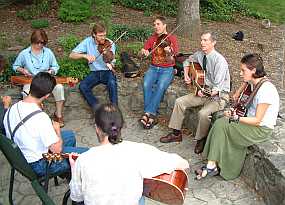Last Friday, after witnessing parking lots lacking the usual Black Friday crush of cars at local malls and shopping centers, I wondered if this holiday shopping season would disappoint retailers and further depress our struggling economy. I wrote “Still-in-the-Red Friday?” and closed my post by asking if the Church is ready for the economic issues coming our way.
If you’re a regular reader, you know that I take the position that God tabbed the Church to do the work of ministry.  Yes, He may rain manna from heaven for the starving, but since the Church was established, His primary means to meet needs is for the Church to meet them. That’s the plan, folks. You can’t read the New Testament and miss that very important fact. (I’ve quoted all the relevant Scriptures in dozens of previous posts. We should all know them anyway.)
Yes, He may rain manna from heaven for the starving, but since the Church was established, His primary means to meet needs is for the Church to meet them. That’s the plan, folks. You can’t read the New Testament and miss that very important fact. (I’ve quoted all the relevant Scriptures in dozens of previous posts. We should all know them anyway.)
What does a Church look like that doesn’t read the signs of the times? What does a Church look like that isn’t prepared to continue to meet the needs of others when times are brutally hard?
I can’t remember quoting a comment in toto, but David Riggins wrote an epic in response to last Friday’s post. I think it encapsulates the issue perfectly:
Interesting the confusion regarding how the Church faces reality. When economic hardships come, people lose their jobs, and when they have no income, they lose their homes. With the current stupidity regarding credit and its uses, people will lose their jobs and homes at a rapid rate. Two million sub-prime ARM loans are up for adjustment in the next 8 months. Those upward adjustments will often add 30% to the current payment those people are paying. Most of those people won’t be able to afford the higher monthly payments, putting $600 billion in bad loans on the books of already tightly stretched lenders like Countrywide. The loan industry has already lost 100,000 jobs in the last six months.
Each of those jobs is responsible for an average of four other jobs in the private sector, from auto salespeople to the bagger at Kroger. With the continuing collapse of the housing sector, home builders will start to go under, following the example of Neumann Homes in Illinois, which filed for bankruptcy protection this month. As more and more sectors of our economy are affected, an estimated 3 million jobs could be lost. This isn’t about spending more to motivate the economy, this is about making sure that what you spend actually has an effect on our economy. What you spend at Wal-Mart, Target, Circuit City or Home Depot lines the pockets of businesses from China to Indonesia, but little of it stays here. The credit used to buy housing is a commodity that pays for the estimated $18 billion net income of the major trading houses on Wall Street, where bonuses are expected to be down 5% from the average $136,580 in 2006. And this is a “bad year. It trickles down, but nothing like it flows up.
All this can be directly attributed to a lack of action on the part of the Church. Our society is corrupt because the Church is corrupt. Greed has run rampant, not merely in the corridors of power and money, but in the desire of the the Church to be seen as relevant and growing. We have created cults centered on charismatic pastors and exciting music, and have abandoned our role.
Is the church ready to take care of the people in the body who will lose their jobs, their homes, their savings? Are we willing to take people into our homes when they’ve lost theirs? If we don’t, who will? Is the Church ready to feed the homeless, provide care for the widow and orphan? As the mortgage crisis wipes out retirement funds, will we take care of the elderly who now only have social security?
I know most church-goers would scoff as these concerns. These are, after all, the responsibility of the government.
Not according to God, they aren’t. And ultimately, it is God we will answer to. I know that, personally, I am not ready to do anything to help anyone. I also know that our church is certainly not ready, and beyond a food pantry for the holidays, has no plan for taking care of the needy, either within or without our congregation. As conditioned as I am to clarion call of independence, I would find it hard to take care of someone who didn’t plan for hardship. It’s only by the grace of God that my family made it through the jobless times we’ve faced. It certainly wasn’t through the help of the “body.
Soon, the entire country could be facing the same situation that Ohio is in, with unemployment up over 7%, but this time, the price of fuel will be triple what it was in the last recession, and that will affect the price of everything else. Are you ready? Is your church? This is about looking out for your neighbor, and making sure they have what they need. This is about making sure your Church body is focused on meeting the real needs of the body, not bottle feeding the 200 pound infants.
We need to grow up, and it seems that we are about to enter one of those times when we either grow, or wither on the vine and get pruned.
Regardless of how well retailers do this Christmas shopping season, the issue remains: Are we as a Church the five wise virgins or the five foolish ones? Are we the Church who by prophetic word hears of the famine to come and prepares for it (Acts 11:38-40)? Are we hearing from God during the fat years so we are prepared for the lean years?
And so what if the lean years don’t come in 2008 or 2080. The issue is Are we ready?
Leonard Ravenhill once said,
The Church today wants to be raptured from responsibility.
That’s a stunning thought on dozens of different levels. Perhaps it even explains why we are not preparing as we should.
What will happen in our churches when we have dozens of unemployed families without medical insurance? What happens when someone in one of those families undergoes a medical emergency and gets stuck with a huge medical bill? What are we doing to be the church known for supernatural healings should that become the only means by which most people receive medical treatment?
As David mentioned above, what happens when people lose homes should the economy go down the tubes? What will your church do? What do you have in place right now to address that issue? And if your church has nothing in place, why not?
What will happen to evangelism when we’re trying to keep our heads down at work to lessen the chances of being the one pink-slipped when the inevitable downsizings come? Are our churches ready to pick up the pieces when our frontline people take that kind of hit? Or will that be chalked up to “the cost of doing ministry” with us leaving those frontliners to struggle in the aftermath?
We went through a precursor the last recession, which many believed lasted almost five years. What if the next recession is eight years and far deeper? It may have been your neighbor who got whacked last time. Tough for him, right? What if it’s you this time? What happens when you turn to your brothers and sisters in Christ and they look the other way?
What happens when the lost, people without the hope we have in Christ and without membership in the Body of Christ, come to us desperate for help and direction? Do we toss them a Bible and say, “Be warm and filled,” because we didn’t take our own membership in the Body of Christ seriously enough to seek the Lord so we knew in advance how He would have us prepare?
I’m not fearmongering here. What I’m doing is asking why the American Church is oblivious to these issues. Rather than being proactive, we’re reactive—and long after the damage has been done. We can’t continue to be so unprepared.
It’s not enough to say, “God will provide,” when the means by which He’s chosen to provide is asleep at the switch.
I ask again, “Church, are we ready?”

 We “exacerbate unemployment issues by staying put” and cause untold hardship fighting for zoning laws that restrict sprawl and consumerism.
We “exacerbate unemployment issues by staying put” and cause untold hardship fighting for zoning laws that restrict sprawl and consumerism. Such a move makes us less dependent on consuming and more dependent on each other. Not only this, but we encourage others to use their gifts. We provide an example to the young and to each other. The musical talents we share uplift the community that forms around our music.
Such a move makes us less dependent on consuming and more dependent on each other. Not only this, but we encourage others to use their gifts. We provide an example to the young and to each other. The musical talents we share uplift the community that forms around our music.